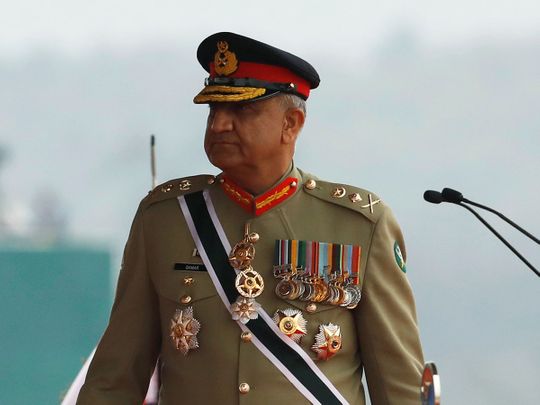
By Aqil Shah
Islamabad: Since its foundation in 1947, Pakistan has spent more than three decades under military rule. Even when out of power, the military has exerted behind-the-scenes influence to maintain its firm grip on politics and national security. Establishing democratic institutions, including civilian control of the military, has thus been an arduous process riddled with uncertainty, backsliding and reversal.
The military has often found civilian politicians willing to do its bidding.
On August 19, Prime Minister Imran Khan extended the term of Gen. Qamar Bajwa, the chief of the country’s army, by three more years. General Bajwa was supposed to retire in November, but the decision was made in view of the “regional security environment.”
Two days before General Bajwa’s extension was about to kick in, the Supreme Court of Pakistan considered a petition challenging it and suspended the extension. Eventually, the Supreme Court gave the general a six-month extension and ordered the government to get the Parliament of Pakistan to decide on such an extension and its duration.
Prime Minister Khan’s Pakistan Tehreek-e-Insaf party introduced legislation in the Parliament that would give Khan and any future prime minister the power to extend the tenures of the chiefs of staff of the army, navy and air force, and the largely ceremonial post of chairman, Joint Chiefs of Staff Committee.
On January 7, the Parliament hurriedly passed the legislation as the country’s main opposition parties voted in support of the law. They are the Pakistan Muslim League (Nawaz) of former Prime Minister Nawaz Sharif and the Pakistan People’s Party run by the slain former Prime Minister Benazir Bhutto’s son Bilawal Bhutto, which have alleged that the 2018 elections which brought Khan to power were rigged by the military under General Bajwa.
The supporters of PML (N), PPP and the country’s beleaguered civil society activists interpreted it as a stark betrayal of their apparent commitment to the democratic process. They seem particularly disappointed with Sharif, who has popularised the slogan, “vote ko izzat do” or “honour the ballot,” a thinly veiled rebuke to the military’s habitual political meddling.
Sharif stepped down as prime minister in 2017 after the Supreme Court of Pakistan disqualified him from holding public office after a corruption inquiry linked to the Panama Papers. He was not named in the Panama leaks and there is no evidence that he abused public office for private gain, but the judges disqualified him for hiding assets, and therefore failing to being “honest,” a constitutional requirement for being a member of Parliament.
Sharif chose to defy the powerful military and galvanised his support base in Punjab, the country’s most populous province, against its political influence while campaigning for the 2018 parliamentary elections. Despite the military’s dogged efforts - encouraging defections and bringing in false corruption cases against party leaders - to ensure the defeat of Sharif’s party, it managed to win the highest number of seats in the Punjab provincial legislature and the second highest in the National Assembly.
Sharif is an unlikely principled democrat. In 2000, he meekly accepted going into exile to Saudi Arabia after the military led by Gen. Pervez Musharraf removed him in a coup in 1999. He has since redeemed himself by asserting civilian supremacy over the generals while in power, despite its high political costs. He has also refused to strike a deal with the military, despite suffering from life-threatening medical ailments while being imprisoned on corruption charges.
Since he was allowed to travel abroad for specialised emergency medical treatment in November, Sharif appears to have softened his stance towards the military, presumably under the influence of his younger brother and current PML (N) President Shahbaz Sharif, who is not averse to working with the generals to resurrect the party’s fortunes.
Bilawal Bhutto, the PPP leader, emphasised the need for proper scrutiny of the law, but retreated after citing the party’s inability to affect the outcome given its low share of parliamentary seats. But his father and former President Asif Ali Zardari’s release on bail in an alleged money laundering case in December suggests a tacit accommodation with the military. Several prominent members of both the PML (N) and the PPP reportedly opposed the legislation, but were overruled by the top party leaders who control decision-making.
It wasn’t just a matter of supporting the new legislation that has disappointed Pakistani democrats. What also dashed their hopes was the manner in which the PML (N) and the PPP unconditionally and hastily approved the law without even a perfunctory debate, let alone dissent.
Pakistan’s army has long been the ultimate arbiter of politics in the country, which has tilted the political playing field against its opponents with detrimental consequences for democracy. Politicians have turned to the military as a shortcut to power and their politically expedient knocks on the doors of the barracks have allowed the generals to divide and rule.












